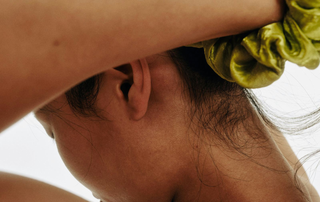What you eat plays a vital role in your hair and scalp health. The scalp, like any other part of the body, requires proper nutrition to function well, and a balanced diet rich in essential vitamins, minerals, and nutrients can help maintain a healthy scalp environment.
In this article, we’ll explore how diet influences scalp health, which nutrients are key for maintaining balance, and how small nutritional changes can support overall scalp wellbeing.
Why is a healthy scalp so important?
The scalp contains hair follicles, sebaceous glands, and a delicate microbiome that protects against infection and irritation. When the scalp’s natural balance is disrupted—whether through excessive oil, dryness, inflammation, or product buildup—issues such as dandruff, itching, or more serious conditions like scalp psoriasis and seborrhoeic dermatitis can develop.
While topical treatments like Polytar Scalp Shampoo can manage symptoms, internal factors such as diet, hydration, and stress also influence overall scalp condition.
How your diet affects your scalp
The scalp is a living tissue where cells regenerate rapidly, meaning it needs a consistent supply of nutrients to stay healthy. Poor nutrition or nutrient deficiencies can weaken the scalp’s barrier function, contribute to dryness or inflammation, and disrupt the oil balance that keeps the scalp hydrated. An unhealthy diet can also cause:
Inflammation and scalp disorders
Diets high in processed foods, refined sugar, and saturated fats may promote inflammation, potentially worsening symptoms of inflammatory scalp conditions such as psoriasis, eczema, and seborrhoeic dermatitis.
Anti-inflammatory foods such as fatty fish, leafy greens, berries, and nuts may help reduce inflammation and ease scalp irritation.
The microbiome connection
The scalp has its own microbiome—communities of bacteria and fungi that maintain balance and protect against harmful organisms. A poor diet may disrupt this ecosystem, contributing to dandruff and irritation. Probiotic-rich foods like yoghurt, kefir, sauerkraut, and kimchi can help support microbial balance.
What to eat to ensure a healthy scalp
Certain vitamins and minerals are particularly important for scalp integrity and function. Key nutrients include:
1. Omega-3 fatty acids
Omega-3s help nourish the scalp, reduce inflammation, and support healthy hair growth. A deficiency may lead to dryness, flakiness, and brittle hair. Foods rich in omega-3 include:
- Salmon
- Sardines
- Mackerel
- Anchovies
- Flaxseeds
- Walnuts
- Chia seeds
2. Zinc
Zinc supports cell regeneration and immune function, helps control oil production, and promotes healing. It also strengthens hair follicles. Food sources include:
- Shellfish (especially oysters)
- Pumpkin seeds
- Chickpeas
- Whole grains
- Legumes
- Eggs
- Red meat
- Poultry
3. Vitamin A
Vitamin A regulates sebum production. Both deficiency and excess can cause scalp problems. Sources include:
- Carrots
- Sweet potatoes
- Spinach
- Cantaloupe
- Mangoes
- Liver
- Eggs
- Milk
- Cheese
- Oily fish
- Yoghurt
4. Vitamin E
Vitamin E supports circulation and protects scalp cells from oxidative stress. Good sources include nuts, seeds, avocados, and leafy greens.
5. B Vitamins (especially Biotin and B12)
Biotin supports keratin production, while B12 helps with red blood cell formation and oxygen delivery to the scalp. Sources include:
- Meat and poultry
- Fish
- Legumes
- Seeds
- Eggs
- Dairy products
- Leafy greens
6. Iron
Iron deficiency can disrupt the hair growth cycle due to reduced oxygen delivery to hair follicles, leading to dryness and hair loss. Foods rich in iron include:
- Lean meats
- Spinach
- Lentils
- Fortified cereals
- Beans
- Tofu
7. Vitamin D
Low vitamin D levels are linked to inflammatory scalp conditions such as psoriasis and eczema. Sunlight is the best source, but eggs and oily fish can also help.
How does dehydration affect scalp health?
Dehydration doesn’t directly cause scalp disorders, but staying hydrated supports skin and scalp comfort. Inadequate fluid intake can lead to a tight, irritated, or dry scalp.
Drinking around two litres of water daily helps maintain sebum balance and nutrient transport. Herbal teas, hydrating fruits, and reduced caffeine can also support scalp hydration.
What foods should you limit for a healthier scalp?
To avoid triggering scalp issues, try limiting:
- Refined sugars: May promote inflammation and feed yeast linked to dandruff.
- Processed foods: High-fat, low-nutrient diets can aggravate oily scalp conditions.
- Dairy (for some people): Excessive intake may worsen dandruff or itching.
- Alcohol and caffeine: Overconsumption may contribute to dehydration and irritation.
How Polytar can help maintain scalp health
While nutrition supports scalp health from within, some conditions require targeted topical care. Polytar Scalp Shampoo contains 4% coal tar solution and is indicated for psoriasis, seborrhoeic dermatitis, eczema, itchiness, and scaling related to these conditions and dandruff. It helps reduce scaling, inflammation, and itchiness.
Used alongside a balanced diet and healthy lifestyle, Polytar Scalp Shampoo can help manage symptoms and support overall scalp comfort. Always read the label and use as directed. If symptoms persist, consult your doctor or pharmacist.







